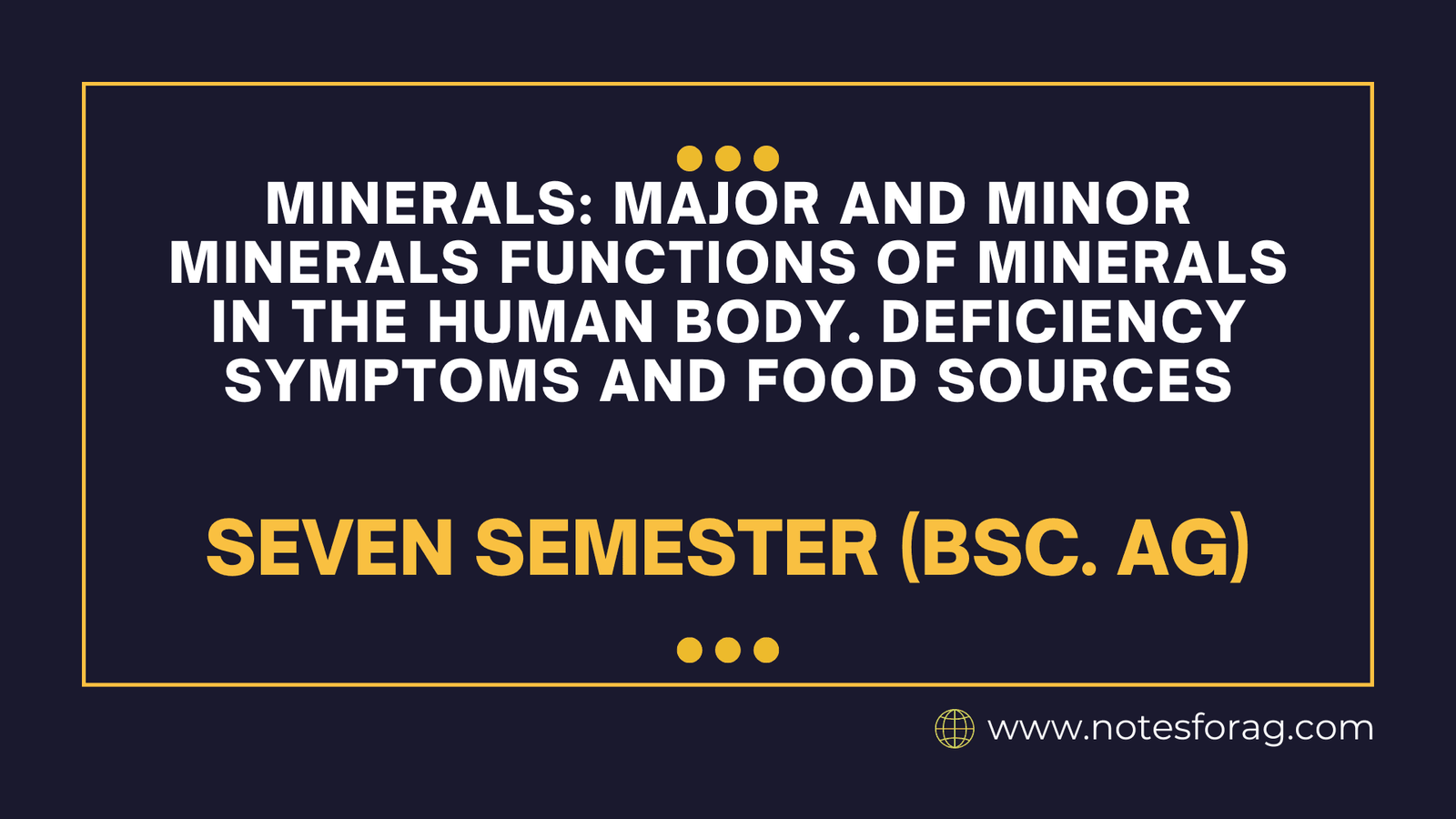What are Minerals ?
Minerals are vital nutrients our bodies require for a range of important functions. They help strengthen bones, produce hormones, support nerve function, and keep our heart beating smoothly. Minerals are divided into two categories: major minerals, which are needed in larger amounts, and trace or minor minerals, required in smaller quantities. Even though we need trace minerals in lesser amounts, they are just as crucial. Here’s a breakdown of major and minor minerals, their roles, what deficiency looks like, and where to find them in food.
Table of Contents
Major Minerals
Calcium

Function: Calcium is essential for building strong bones and teeth. It also supports muscle function, nerve signals, and blood clotting.
Deficiency Symptoms: Lack of calcium can weaken bones, leading to osteoporosis and fractures in older adults, and may cause rickets in children, making bones soft and weak.
Food Sources: Found in dairy products (milk, yogurt, cheese), leafy green vegetables, almonds, and fortified plant-based milks.
Phosphorus
Function: Works together with calcium for bone and teeth strength and is important in energy production in cells.
Deficiency Symptoms: Though rare, it can cause weak bones, fatigue, and loss of appetite.
Food Sources: Found in meat, fish, dairy, nuts, beans, and whole grains.
Magnesium
Function: Supports muscle and nerve health, regulates blood pressure, and is important for bone structure.
Deficiency Symptoms: Signs include muscle cramps, fatigue, mood swings, and mental fog.
Food Sources: Found in leafy greens, nuts (especially almonds), seeds, whole grains, and legumes.
Sodium
Function: Maintains fluid balance in the body, supports muscle contractions, and aids nerve function.
Deficiency Symptoms: Rare due to the high salt intake in diets, but deficiency can cause cramps, nausea, and headaches.
Food Sources: Salt, processed foods, canned soups, and condiments.
Potassium
Function: Balances body fluids with sodium, supports nerves and muscles, and helps regulate blood pressure.
Deficiency Symptoms: Muscle weakness, fatigue, and, in severe cases, heart irregularities.
Food Sources: Bananas, oranges, potatoes, tomatoes, and leafy greens.
Chloride
Function: Assists in fluid balance and digestion, as it’s a key component of stomach acid.
Deficiency Symptoms: Very rare, but may cause muscle weakness, dehydration, and appetite loss.
Food Sources: Found in table salt, seaweed, tomatoes, and lettuce.
Sulfur

Function: Part of certain amino acids and vitamins, sulfur helps detoxify the body and protect cells.
Deficiency Symptoms: No clear symptoms, as needs are met with adequate protein intake.
Food Sources: Protein-rich foods like meat, fish, eggs, and some plant foods like garlic, onions, and cruciferous vegetables.
Trace (Minor) Minerals
Iron

Function: Iron is critical for making hemoglobin, which transports oxygen in our blood.
Deficiency Symptoms: Leads to iron-deficiency anemia, resulting in fatigue, pale skin, and weakness.
Food Sources: Red meat, poultry, seafood, beans, spinach, and fortified cereals.
Zinc
Function: Boosts immune health, aids in wound healing, and is needed for DNA production. Zinc also supports taste and smell.
Deficiency Symptoms: Symptoms include poor wound healing, hair loss, and loss of taste and smell.
Food Sources: Meat, shellfish, dairy, legumes, and seeds.
Copper
Function: Copper is necessary for red blood cell production and supports nerve and immune health. It also aids in iron absorption.
Deficiency Symptoms: Rare, but may cause anemia, weakened immunity, and brittle bones.
Food Sources: Shellfish, nuts, seeds, whole grains, and dark chocolate.
Manganese
Function: Plays a role in metabolism, bone development, and protects against cell damage.
Deficiency Symptoms: Rare but may lead to poor bone health and slow growth.
Food Sources: Whole grains, nuts, leafy vegetables, and tea.
Iodine
Function: Essential for thyroid hormones, which regulate metabolism.
Deficiency Symptoms: Causes goiter (thyroid gland swelling), fatigue, and weight gain.
Food Sources: Iodized salt, seafood, dairy, and eggs.
Selenium
Function: Acts as an antioxidant, protecting cells and supporting metabolism.
Deficiency Symptoms: Weakened immune response, muscle pain, and in extreme cases, heart disease.
Food Sources: Brazil nuts, seafood, meats, and grains.
Fluoride
Function: Important for dental health, fluoride helps prevent tooth decay.
Deficiency Symptoms: Deficiency can lead to a higher risk of cavities.
Food Sources: Fluoridated water, tea, and seafood.
Chromium
Function: Helps regulate blood sugar by enhancing insulin’s effects.
Deficiency Symptoms: Blood sugar imbalances, fatigue, and anxiety.
Food Sources: Meat, whole grains, broccoli, and potatoes.
Molybdenum
Function: Essential for enzymes that help break down toxins.
Deficiency Symptoms: Rare, but can result in neurological issues.
Food Sources: Legumes, grains, and nuts.
The Importance of a Balanced Mineral Intake
Each mineral supports unique functions, often working together to keep the body in balance. For example, calcium and magnesium both support bone health, while sodium and potassium balance fluids and nerve function. Deficiencies in one mineral can disrupt these systems, so a well-rounded diet that includes a variety of these minerals is essential. You can find them in foods like fruits, vegetables, whole grains, lean proteins, and dairy (or fortified substitutes). If you follow a restricted diet or have health concerns, focusing on particular foods or consulting with a healthcare provider can help ensure adequate mineral intake.
Frequently Asked Questions (FAQ)
Is supplementation necessary for minerals?
Most people can meet their mineral needs through food alone, but some may require supplements due to dietary restrictions, health conditions, or pregnancy. Supplements should be taken only under medical guidance to avoid imbalances or toxicity.
Why is iron important, and what are symptoms of iron deficiency?
Iron is necessary for making hemoglobin, the protein in red blood cells that carries oxygen. A deficiency in iron can lead to anemia, causing symptoms like fatigue, weakness, and pale skin.
Related Articles

